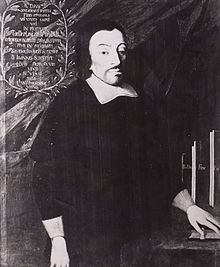Our website is made possible by displaying online advertisements to our visitors.
Please consider supporting us by disabling your ad blocker.
Angelus Silesius
Angelus Silesius | |
|---|---|
 | |
| Born | Johann Scheffler baptised 25 December 1624 |
| Died | 9 July 1677 (aged 52) Breslau, Silesia, Habsburg monarchy |
| Alma mater | University of Strasbourg Leiden University University of Padua |
| Occupation(s) | Catholic priest, physician, mystic and religious poet |
| Notable work | Heilige Seelen-Lust (1657) Cherubinischer Wandersmann (1657) Ecclesiologia (1677) |
Angelus Silesius, OFM (c. 1624 – 9 July 1677), born Johann Scheffler, was a German Catholic priest, physician, mystic and religious poet. Born and raised a Lutheran, he began to read the works of medieval mystics while studying in the Netherlands and became acquainted with the works of the German mystic Jacob Böhme through Böhme's friend Abraham von Franckenberg.[1] Silesius's display of his mystic beliefs caused tension with Lutheran authorities and led to his eventual conversion to Catholicism in 1653, wherein he adopted the name Angelus (Latin for "angel" or "heavenly messenger") and the epithet Silesius ("Silesian").[2] He entered the Franciscans and was ordained a priest in 1661. Ten years later, in 1671, he retired to a Jesuit house where he remained for the rest of his life.[2]
An enthusiastic convert and priest, Silesius worked to convince German Protestants in Silesia to return to the Catholic Church.[2] He composed 55 tracts and pamphlets condemning Protestantism, several of which were published in two folio volumes entitled Ecclesiologia (i.e., Ecclesiology). However, he is now remembered chiefly for his mystical poetry, and in particular for two poetical works, both published in 1657: Heilige Seelen-Lust (The Soul's Holy Desires), a collection of more than 200 religious hymn texts that have since been used by both Catholics and Protestants; and Cherubinischer Wandersmann ("The Cherubic Pilgrim"), a collection of 1,676 short poems, mostly in Alexandrine couplets. His poetry explores contemporary themes of the greatness of God, mystic interpretations of the Trinity, quietist practices, and pantheism within an orthodox Catholic context.[2]
- ^ Paterson, Hugh Sinclair; Exell, Joseph Samuel (October 1870). "Angelus Silesius: Physician, Priest and Poet". The British & Foreign Evangelical Review. Vol. XIX. London: James Nisbet & Co. pp. 682–700, based in large part on Kahlert, August (Dr.). Angelus Silesius: Ein literar-historiche Untersuchung (Breslau: s.n., 1853).
{{cite book}}: CS1 maint: postscript (link) - ^ a b c d Benedict, Guldner (1907). . In Herbermann, Charles (ed.). Catholic Encyclopedia. Vol. 1. New York: Robert Appleton Company.
Previous Page Next Page


